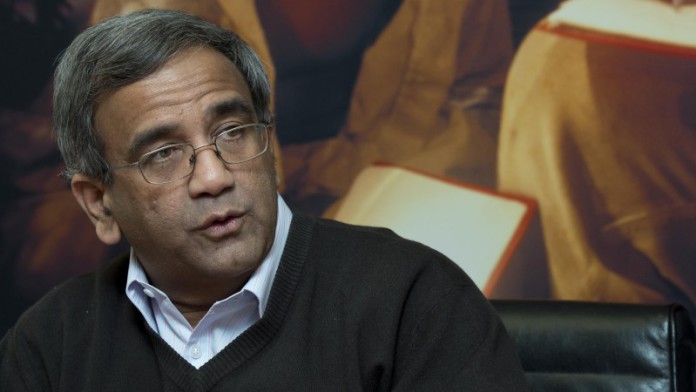
ANGLOGOLD Ashanti successfully negotiated the typically difficult first quarter of the financial year reducing the net cash outflow by nearly $50m year-on-year to $70m whilst its output and cost numbers were solidly within guidance.
Production came in at 824,000 oz (Q1 2007: 830,000 oz) at an all-in sustaining cost (AISC) of $1,030/oz which sets the group up to meet guidance of 3.33 million to 3.45 million oz at an AISC of $990 to $1,060/oz assuming R12,79 to the dollar. The rand averaged R11,96 to the dollar for the quarter. A 10% weakening in local currency is equal to $62/oz in AISC assuming a gold price of $1,250/oz.
The group’s cash situation would have been better but for exceptional, one-off items. For instance, a $15m receiveable from Harmony – which actually came in a few days after the first quarter period closed – would have lowered the outflow further. Excluding the impact of $36m in retrenchment costs from Kopanang, sold to Heaven Sent, a Chinese firm, and a $15m VAT lock-up from Tanzania, AngloGold would have been cash break-even.
Srinivasan Venkatakrishnan, CEO of AngloGold, declared himself satisfied with the production quarter; especially at Sunrise Dam in Australia which improved production 54% year-on-year in the first quarter following a rejig in its mining strategy and higher underground grades. Kibali in the Democratic Republic of Congo (DRC) also performed well.
And with Kopanang and Moab Khotsong out of its hair (the latter was sold to Harmony Gold) the likelihood AngloGold will begin to generate free cash flow, even at the current rand gold price, is good. Net debt is also well contained at $1.8bn from $2bn quarter-on-quarter and at net debt to earnings before tax, interest, depreciation and amortisation of 1.14x compares favourably to AngloGold’s stated sustainable debt target of 1.5x.
“We forecast improving metrics for AngloGold as portfolio quality improves through high incremental ROIC projects and asset disposals,” said Deutsche Bank gold analyst Patrick Mann who rates AngloGold a buy. “The stock has been very weak over the past few days mainly as a result of renewed concerns around South Africa – this should allay some fears and we expect the stock to outperform peers post this,” said Goldman Sachs in a report. AngloGold’s figures were “a strong set of results”.
Longer term, however, shares in AngloGold have been affected by concerns about regulatory changes in Tanzania where the group’s operates its largest single contributor to gold output in the Geita mine. Regulations to legislation enacted last year by the John Magufuli government have done little to assuage the concerns.
Venkatakrishnan said in a media call this morning that negotiations with the Tanzanian government were continuing, whilst the group also kept a parallel stream of international aribtration open to it. “We continue to operate the asset and continue to invest in it,” said Venkatarkishnan. “Dialgoue is ongoing and constructuve and we think there is scope for interpretation in the regulations,” he said.
Venkatakrishnan said that “… in simple terms” the new legislation calls for a 2% royalty and levies of an additional 1% on revenue “… which is why Geita’s costs have gone up,” he said. “We are also not getting the VAT on inputs back which is locking up $3m to $4m a month and Christine [Ramon, AngloGold CFO] is looking at ways to tackle it,” he said.
In the long run, AngloGold is hoping Geita is not subject to the new taxes in terms of its Mine Development Agreements. Since Magafuli enacted the legislation in June, shares in AngloGold Ashanti have fallen about 30%. Shares in Gold Fields and Newmont Mining, for instance, are either flat or slightly higher over the same time-frame.
There are also worries regarding the DRC’s newly enacted Mining Code. “In the DRC, we are working with Randgold Resources who will take the lead in negotiations in run up to regulations being promulgated,” said Venkatakrishnan. The Kibali mine, in which AngloGold and Randgold have equal 45% stakes with the government holding the balance, has a 10-year stability agreement which the parties are hoping to impose.








